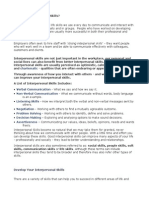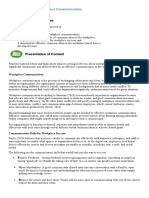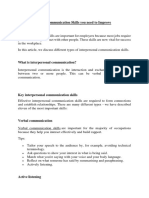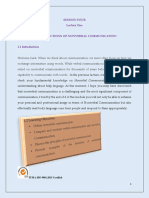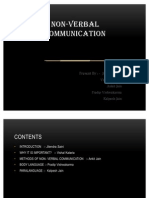0 ratings0% found this document useful (0 votes)
16 viewsModule 3
This document discusses building healthy relationships through effective communication. It provides 12 tips for strong communication skills, including active listening, awareness of communication styles, persuasion, giving feedback, and conflict management. Effective communication plays a vital role in relationships by allowing understanding between people with different viewpoints. Relationships can either better or worsen one's life depending on whether boundaries are set and clear communication is used to avoid misunderstandings. Basic human instincts like fear are innate behaviors not learned through experience.
Uploaded by
preethamip07Copyright
© © All Rights Reserved
Available Formats
Download as PDF, TXT or read online on Scribd
0 ratings0% found this document useful (0 votes)
16 viewsModule 3
This document discusses building healthy relationships through effective communication. It provides 12 tips for strong communication skills, including active listening, awareness of communication styles, persuasion, giving feedback, and conflict management. Effective communication plays a vital role in relationships by allowing understanding between people with different viewpoints. Relationships can either better or worsen one's life depending on whether boundaries are set and clear communication is used to avoid misunderstandings. Basic human instincts like fear are innate behaviors not learned through experience.
Uploaded by
preethamip07Copyright
© © All Rights Reserved
Available Formats
Download as PDF, TXT or read online on Scribd
You are on page 1/ 14
MODULE 3: CREATION OF
HEALTHY AND CARING
RELATIONSHIPS
BUILDING COMMUNICATION
SKILLS:
Communication is the sending and receiving of information and can be one-on-one or between
groups of people, and can be face-to-face or through communication devices. It happens between
a sender and a receiver.
Derivation of the word:
Communication derives from a Latin word called ’communicare’, which means "to share”.
Types of communication:
1.Non-verbal communication
Nonverbal communication explains the processes that convey a type of information in a form of
non-linguistic representations. Examples of nonverbal communication includes like gestures, body
language, facial expressions, eye contact etc.
2.Verbal communication
Verbal communication is the spoken or written conveyance of a message.
DEFINITIONS:
1. ” Communication is transfer of information from one person to another,
whether or not it elicits confidence. But the information transferred must be
understandable to the receiver” – G.G. Brown.
2. “Communication is the intercourse by words, letters or messages”- Fred G.
Meyer.
1. Active Listening
Active listening involves paying close attention to what others are saying, and asking
clarifying questions to demonstrate interest and understanding. This facilitates
effective communication while simultaneously allowing us to show respect and build
relationships with the other person with whom we are communicating.
2. Awareness of Communication Styles
There are four main communication styles you might encounter. They are:
1.Passive: Passive communicators are quieter and don’t always express their true feelings. They can act
indifferent or agreeable, depending on the situation, in order to keep the peace and not rock the boat.
2.Aggressive: Aggressive communicators are the opposite of passive communicators, and often express their
emotions freely without any consideration for others. They can be intimidating or abusive in their interactions
with others.
3.Passive-aggressive: Passive-aggressive communicators strive to appear aloof, even when they are actually
upset or annoyed. It is subtly evident that they are angry, but because they tend to avoid confrontation, it can
be unclear what they are truly thinking.
4.Assertive: Assertive communicators are considerate and express themselves in a clear and direct manner.
They are respectful in their interactions with others.
3. Persuasion
The ability to persuade others is very useful in the workplace, and employers value
employees who demonstrate proficient persuasive skills because it can lead to
increased productivity. The skill involves convincing others to complete a desired
action or behave in a specific way, typically to achieve an end goal.
4. Giving Feedback
Communication is a two-way street, and strong communicators are able to provide and accept feedback. Good
feedback offers answers to questions and solutions to problems. The goal of feedback is improvement or
betterment.
5. Written Communication
Written communication is just as important as verbal communication in the workplace. It is often the first
communication you share with an employer, even before you are hired. You should always be clear and
concise in your written communications.
6. Confidence
This is particularly important in the workplace, because people are more likely to respond to your ideas and
opinions if they are presented with confidence. Confidence can be demonstrated through eye contact, tone of
voice, and good posture. It helps to be prepared when making a presentation or argument so that you don’t
stumble over your words and can deliver your statements with poise.
7. Openness
It is best to approach workplace communications with an open mind. You should accept that you might not
always agree with someone’s point of view, but try to be sympathetic to their perspective and always show
respect. This way, you can disagree amicably, and avoid causing rifts that may affect future work.
8. Presentations and Public Speaking
To communicate successfully when giving a speech or presentation, it is important to hook your audience
immediately and try to garner their interest. Many effective communicators use notes to guide their
presentations—just be sure to maintain regular eye contact with your audience to keep them engaged.
With nerves, it’s easy to rush through your points quickly. Don’t forget to pace yourself! To be effective,
project your voice and use visual aids if necessary. Lastly, you should end on a strong note, to ensure that your
entire presentation leaves a lasting impression.
9. Empathy
Empathy involves a shared understanding of others’ emotions, which is critical when it comes to
communicating at work. If you understand how or what someone is feeling, you can assess how to best
communicate with them, and choose the right approach.
10. Cross-Cultural Communication
In today’s global economy, it is important to acknowledge cultural diversity and try to transcend
communication barriers. The best way to approach this is to be patient, respectful, and open to learning and
understanding cultural differences.
11. Digital Communication
Digital communication involves all online communication for an organization. Proficiency in digital
communication is becoming increasingly necessary in the workplace, with the onslaught of social media and
digital devices. To be successful in digital communication, adopt a growth mindset because you will have to
continue learning to keep up to date with ever-evolving digital media.
12. Conflict Management
Conflict management skills are hugely important in the workplace. Successful conflict management involves
hearing all sides of a situation, being able to empathize, and resolving any issues. Usually, conflicts can be
managed with compassion, patience, and some problem-solving. Taking ownership of one’s actions and being
able to apologize is also key.
THE VALUE OF RELATIONSHIPS
AND COMMUNICATION:
Communication plays a vital role in having a good relationship. We should be a good
listener before we become a speaker. Listening has to have the patience. Before
arguing on something, we should consider the view points of others too. We should
respect others thoughts, feelings and emotions. Most of the misunderstanding will
happen due to poor communication. Rather than reacting on something, it is better to
respond. In a daily day of ours life, we do come across different personalities. So, we
need to be non judgemental, empathetic, and most importantly, we need to have
patience to deal with different types of people in the society.
RELATIONSHIPS FOR BETTER
OR WORSENING OF LIFE:
Having a healthy relationship is very much important to lead a better life. Our life
goals are determined by our surroundings . When we do find the similarities in the
interest with others, we do feel connected to them and will develop attachment with
those people. But its always good to set a boundary so that you may not suffer later
when something wrong happens in your relationship. Have a clear cut
communication so that you can avoid misunderstandings. We are not supposed to
over connect with the feelings or emotions. Too much trust or too much faith is not
good in relationships. If something went wrong, then it will worsen your life.
UNDERSTANDING OF BASIC
INSTINCTS OF LIFE
Instincts are goal-directed and innate patterns of behavior that are not the
result of learning or experience.
In other words, instincts are nothing but the impulse or the motivation
that you are getting for an external stimuli.
For an example, FEAR – when you see a snake, you will be afraid of
passing by it’s side. This behavior is not a learnt one but it is innate.
THANK YOU
You might also like
- Communication Skills: Learn How to Talk to Anyone, Read People Like a Book, Develop Charisma and Persuasion, Overcome Anxiety, Become a People Person, and Achieve Relationship Success.From EverandCommunication Skills: Learn How to Talk to Anyone, Read People Like a Book, Develop Charisma and Persuasion, Overcome Anxiety, Become a People Person, and Achieve Relationship Success.5/5 (46)
- Improving Communication - Developing Effective Communication SkillsNo ratings yetImproving Communication - Developing Effective Communication Skills7 pages
- Documenting Childrens Learning Examples PDF100% (1)Documenting Childrens Learning Examples PDF19 pages
- I. The Importance of Good Communication SkillsNo ratings yetI. The Importance of Good Communication Skills12 pages
- Memo Snr Managment 015 Effective CommunicationNo ratings yetMemo Snr Managment 015 Effective Communication6 pages
- 7 Important Communication Techniques in The WorkplaceNo ratings yet7 Important Communication Techniques in The Workplace24 pages
- Developing Communication Skills Can Help Many Aspects of Your LifeNo ratings yetDeveloping Communication Skills Can Help Many Aspects of Your Life9 pages
- But We Already Have A Company Bulletin To Tell Everyone What Is HappeningNo ratings yetBut We Already Have A Company Bulletin To Tell Everyone What Is Happening6 pages
- 10 Communication Skills for Your Life and Career SuccessNo ratings yet10 Communication Skills for Your Life and Career Success8 pages
- Purposive Communication: Name: Mary Mae Ternora Course:Bsba Mk-1CNo ratings yetPurposive Communication: Name: Mary Mae Ternora Course:Bsba Mk-1C14 pages
- Topic 1 Effective Workplace CommunicationNo ratings yetTopic 1 Effective Workplace Communication3 pages
- Alishba Effective Communication Skills BsNo ratings yetAlishba Effective Communication Skills Bs27 pages
- OceanofPDF.com a Guide to Being a Better Communicator in - Nick Caldwell 2No ratings yetOceanofPDF.com a Guide to Being a Better Communicator in - Nick Caldwell 255 pages
- Why Are Interpersonal Skills Important?: Develop Interpersonal Skills at Work - It Is Rightly Said That A SmartNo ratings yetWhy Are Interpersonal Skills Important?: Develop Interpersonal Skills at Work - It Is Rightly Said That A Smart37 pages
- LC 2 Mod 2 Concept Aspect and Changes in Culture SocietyNo ratings yetLC 2 Mod 2 Concept Aspect and Changes in Culture Society7 pages
- Communication and The Therapeutic RelationshipNo ratings yetCommunication and The Therapeutic Relationship21 pages
- Republic of The Philippine Department of Education Pasig CityNo ratings yetRepublic of The Philippine Department of Education Pasig City53 pages
- Lo1:-Identify Customer Needs: Instruction Sheet Learning Guide #60No ratings yetLo1:-Identify Customer Needs: Instruction Sheet Learning Guide #6041 pages
- 4 MS 2nd Generation Sequence Three - Me, My Community and Citizenship - All Lessons by Khelil Moudjib Arrahmane 2019-2020100% (1)4 MS 2nd Generation Sequence Three - Me, My Community and Citizenship - All Lessons by Khelil Moudjib Arrahmane 2019-202054 pages
- Ways To Provide Feedback (English Presentation)No ratings yetWays To Provide Feedback (English Presentation)13 pages
- Principles and Functions of Non Verbal Communication PDF100% (1)Principles and Functions of Non Verbal Communication PDF22 pages
- Business Communication - EnG301 Power Point Slides Lecture 13No ratings yetBusiness Communication - EnG301 Power Point Slides Lecture 1323 pages
- Week 2 Lecture Notes Fundamentals of NursingNo ratings yetWeek 2 Lecture Notes Fundamentals of Nursing8 pages
- Lesson 1 The Importance of CommunicationNo ratings yetLesson 1 The Importance of Communication5 pages
- Communication Skills: Learn How to Talk to Anyone, Read People Like a Book, Develop Charisma and Persuasion, Overcome Anxiety, Become a People Person, and Achieve Relationship Success.From EverandCommunication Skills: Learn How to Talk to Anyone, Read People Like a Book, Develop Charisma and Persuasion, Overcome Anxiety, Become a People Person, and Achieve Relationship Success.
- Improving Communication - Developing Effective Communication SkillsImproving Communication - Developing Effective Communication Skills
- 7 Important Communication Techniques in The Workplace7 Important Communication Techniques in The Workplace
- Developing Communication Skills Can Help Many Aspects of Your LifeDeveloping Communication Skills Can Help Many Aspects of Your Life
- But We Already Have A Company Bulletin To Tell Everyone What Is HappeningBut We Already Have A Company Bulletin To Tell Everyone What Is Happening
- 10 Communication Skills for Your Life and Career Success10 Communication Skills for Your Life and Career Success
- Purposive Communication: Name: Mary Mae Ternora Course:Bsba Mk-1CPurposive Communication: Name: Mary Mae Ternora Course:Bsba Mk-1C
- OceanofPDF.com a Guide to Being a Better Communicator in - Nick Caldwell 2OceanofPDF.com a Guide to Being a Better Communicator in - Nick Caldwell 2
- Why Are Interpersonal Skills Important?: Develop Interpersonal Skills at Work - It Is Rightly Said That A SmartWhy Are Interpersonal Skills Important?: Develop Interpersonal Skills at Work - It Is Rightly Said That A Smart
- Improve Your People Skills Now: Talk to People ConfidentlyFrom EverandImprove Your People Skills Now: Talk to People Confidently
- The Art of Communication: Mastering Impactful CommunicationFrom EverandThe Art of Communication: Mastering Impactful Communication
- LC 2 Mod 2 Concept Aspect and Changes in Culture SocietyLC 2 Mod 2 Concept Aspect and Changes in Culture Society
- Republic of The Philippine Department of Education Pasig CityRepublic of The Philippine Department of Education Pasig City
- Lo1:-Identify Customer Needs: Instruction Sheet Learning Guide #60Lo1:-Identify Customer Needs: Instruction Sheet Learning Guide #60
- 4 MS 2nd Generation Sequence Three - Me, My Community and Citizenship - All Lessons by Khelil Moudjib Arrahmane 2019-20204 MS 2nd Generation Sequence Three - Me, My Community and Citizenship - All Lessons by Khelil Moudjib Arrahmane 2019-2020
- Principles and Functions of Non Verbal Communication PDFPrinciples and Functions of Non Verbal Communication PDF
- Business Communication - EnG301 Power Point Slides Lecture 13Business Communication - EnG301 Power Point Slides Lecture 13




















